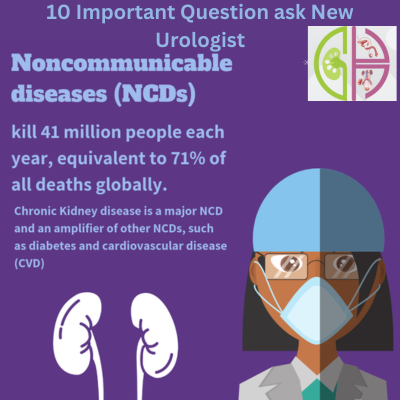


Visiting a urologist can be an intimidating experience, especially if it's your first time. They are medical specialists who diagnose and treat conditions related to the urinary tract and male reproductive system. Whether you're seeking their expertise for a specific problem or for routine check-ups, it's crucial to communicate effectively with your urologist to ensure you receive the best care possible. To help you get the most out of your appointment, here are ten important questions to ask your new urologist.
Before diving into the specifics of your condition, it's essential to get to know your urologist's background. Ask about their years of experience and whether they have a specific area of specialization within urology, such as urologic oncology, male infertility, or pediatric urology. This information can help you gauge their expertise and make you more comfortable with their care.
If you're visiting the urologist for a particular health concern, don't hesitate to ask for a detailed explanation of your diagnosis or condition. Understanding the problem, its causes, and potential treatment options is crucial for informed decision-making.
It often provide various treatment options for the same condition. Inquire about the available treatments, including both conservative and surgical approaches. This will allow you to discuss the pros and cons of each and make an informed choice based on your preferences and circumstances.
Every medical intervention comes with potential risks and benefits. Ask your urologist about the specific risks associated with your treatment plan and how they compare to the potential benefits. This will help you weigh the potential outcomes and make an informed decision about your care.
In some cases, alternative treatments or therapies may be available for your condition. Ask your urologist about any non-surgical or non-pharmaceutical options that might be suitable for your situation. Discuss the effectiveness and potential side effects of these alternatives.
If your treatment plan involves surgery or a procedure, it's essential to understand the expected recovery time. Knowing how long you'll need to take time off work or limit your activities can help you plan accordingly and set realistic expectations.
Understanding the impact of your condition on your daily life is essential. Ask your urologist about any lifestyle changes or restrictions you might need to follow during and after treatment. This can include dietary modifications, exercise recommendations, or sexual activity restrictions.
Complications and side effects can occur with any medical treatment. Ask your urologist about the warning signs of potential problems and what you should do if they arise. Knowing when to seek immediate medical attention can make a significant difference in your recovery.
Urologists often work closely with other healthcare professionals, such as nurses, physical therapists, or nutritionists. Inquire about any support services or resources that might be available to assist you in managing your condition or recovery effectively.
Prevention is an essential aspect of maintaining urological health. Ask your urologist about lifestyle changes or habits you can adopt to reduce the risk of recurrence or the development of other urological conditions in the future.
Open and honest communication with your urologist is vital for receiving the best care possible. Don't hesitate to ask these ten important questions to ensure you fully understand your diagnosis, treatment options, and what to expect during your urological journey. Remember that it is there to provide you with the guidance and support you need to improve your urological health and overall well-being.
Urology is a medical specialty that focuses on the diagnosis and treatment of conditions and diseases related to the urinary tract and male reproductive system.
Common urological conditions include urinary tract infections (UTIs), kidney stones, prostate problems, erectile dysfunction, urinary incontinence, and bladder issues.
Symptoms of a UTI often include frequent urination, a burning sensation during urination, cloudy or bloody urine, and lower abdominal pain.
Kidney stones form when minerals and salts in the urine crystallize. Treatment may involve pain management, hydration, and, in some cases, procedures to remove or break up the stones.
BPH is an enlargement of the prostate gland, commonly seen in aging men. Treatment options include medications, minimally invasive procedures, and surgery to relieve symptoms.
Age, family history, and certain genetic factors can increase the risk of developing prostate cancer. Regular screening with a PSA test and digital rectal exam is recommended for early detection.
Urinary incontinence is the involuntary leakage of urine. It can often be treated or managed with lifestyle changes, pelvic floor exercises, medications, or surgical interventions.
Erectile dysfunction (ED) is typically diagnosed through a physical exam, medical history, and sometimes specialized tests. Treatment may involve lifestyle changes, medications, or therapies like penile implants.
Interstitial cystitis is a chronic bladder condition characterized by frequent urination and pelvic pain. Management may include dietary changes, medications, and bladder instillations.
Maintaining a healthy lifestyle, staying hydrated, practicing safe sex, and regular check-ups with a urologist can help prevent or detect urological diseases early, leading to better outcomes.
These FAQs provide a basic understanding of urological conditions and can serve as a starting point for discussions with a healthcare provider for those seeking more information or experiencing urological issues.